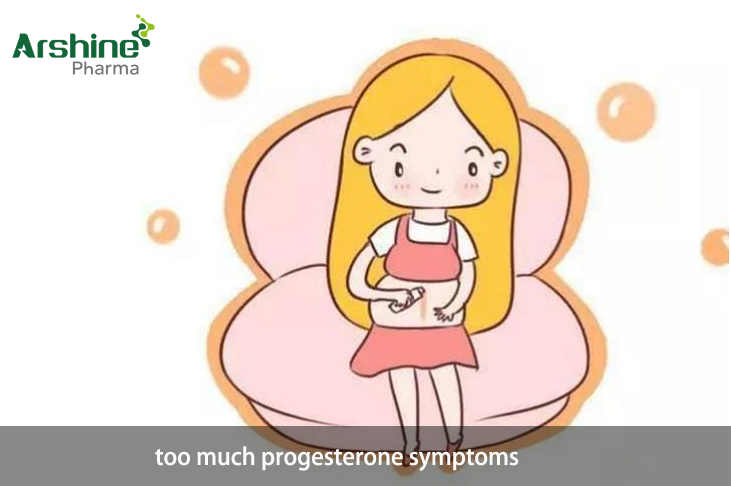
too much progesterone symptoms
Excess progesterone, a naturally occurring hormone primarily associated with the female reproductive system, can lead to a variety of symptoms and effects that can impact overall health and well-being. While progesterone is crucial for various physiological processes, including menstruation, pregnancy, and maintaining a stable uterine environment, an imbalance or excessive production of this hormone can result in a range of symptoms that require attention and management. Understanding the potential effects of excessive progesterone is essential for recognizing and addressing any underlying hormonal issues.
One of the primary areas where excessive progesterone can have noticeable effects is the menstrual cycle. While progesterone levels naturally rise during the second half of the menstrual cycle, known as the luteal phase, to prepare the body for potential pregnancy, an overproduction of progesterone can lead to irregular menstrual cycles. Women might experience changes in the timing, duration, and intensity of their periods. Menstrual bleeding could become heavier or lighter, and cycles may become irregular, causing confusion or concern.
Mood disturbances are another set of symptoms that can manifest with excessive progesterone. While progesterone itself is known to have a calming effect on the central nervous system, an excess of it might lead to mood swings, irritability, and even depression in some cases. This can be particularly relevant during the luteal phase when progesterone levels naturally rise. Women with pre-existing mood disorders might find that excessive progesterone exacerbates their symptoms, potentially leading to heightened emotional sensitivity and a reduced ability to cope with stressors.
Physical symptoms related to excessive progesterone can extend to the digestive system. Some individuals might experience bloating, constipation, or even diarrhea. These gastrointestinal effects can be bothersome and disruptive to daily life, potentially leading to discomfort and decreased overall well-being. The precise mechanisms by which progesterone impacts the digestive system are complex and not yet fully understood, but hormonal imbalances are known to play a role.
Interestingly, excessive progesterone can also have an impact on the skin. Some women might notice an increase in acne outbreaks, particularly around the chin and jawline area. This is due to the hormonal influence on sebum production, the oily substance that can clog pores and lead to acne formation. Changes in hormone levels, including progesterone, can disrupt the delicate balance of skin health, leading to these dermatological manifestations.
Physical sensations can also be affected by excessive progesterone. Some individuals might report breast tenderness and swelling, which is a common symptom associated with hormonal fluctuations. The breast tissue is sensitive to hormonal changes, and elevated levels of progesterone can lead to discomfort and soreness. These symptoms can overlap with premenstrual syndrome (PMS) symptoms, which are already influenced by hormonal changes in the menstrual cycle.
Sleep disturbances and fatigue can also be linked to excessive progesterone. While progesterone has sedative effects and can promote relaxation, an excessive amount might disrupt the normal sleep cycle. Some individuals might experience difficulty falling asleep, staying asleep, or feeling refreshed upon waking. This can lead to daytime fatigue, reduced cognitive function, and an overall decline in quality of life.
Furthermore, excessive progesterone can have implications for fertility and reproduction. While it might seem counterintuitive, chronically high levels of progesterone, especially outside the normal menstrual cycle, can interfere with regular ovulation and menstrual function. This can impact fertility and make it challenging for women who are trying to conceive. Consulting with a healthcare provider is essential for those planning to conceive or experiencing difficulties with their reproductive health.
It's important to note that while the symptoms mentioned above are associated with excessive progesterone, they can also be indicative of other underlying health conditions. Hormonal imbalances can stem from various sources, including polycystic ovary syndrome (PCOS), thyroid dysfunction, or adrenal gland issues. Therefore, a comprehensive medical evaluation is crucial for accurately diagnosing the cause of these symptoms and developing an appropriate treatment plan.
In conclusion, excessive progesterone levels can lead to a wide array of symptoms and effects that span multiple physiological systems. From menstrual irregularities and mood disturbances to skin changes, gastrointestinal issues, and sleep disruptions, the impacts of excessive progesterone can significantly affect an individual's quality of life. Recognizing the potential symptoms of excessive progesterone is crucial for seeking timely medical evaluation and intervention. A healthcare provider can perform comprehensive assessments, including hormone level measurements and clinical evaluations, to determine the underlying cause of these symptoms and develop a tailored treatment approach that addresses the root cause while alleviating the associated discomfort and challenges.
